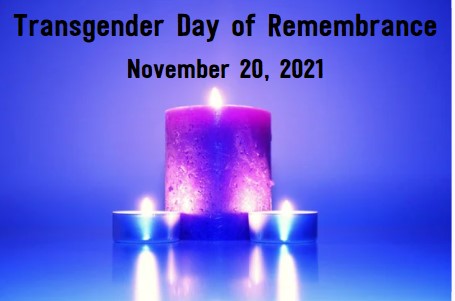This is an archive of news stories and research from the National Union of Public and General Employees. Please see our new site - https://nupge.ca - for the most current information.
“There’s an onus on government and law enforcement to ensure transgender and gender-diverse people feel like they can access their services safely. Trust must be rebuilt.” ― Larry Brown, NUPGE President

Ottawa (18 Nov. 2021) ― Transgender Day of Remembrance (TDoR) is observed annually on November 20. The commemorative day was inspired by the murder of Rita Hester, a Black transgender woman, who was murdered in 1998. She was 34 years old.
TDoR is both a day of remembrance for all the transgender people who have been murdered and a day of action to raise public awareness of hate crimes against transgender and gender-diverse people.
375 transgender and gender-diverse people reported murdered in the past year
Transrespect versus Transphobia Worldwide compile an annual update on reported violence against transgender and gender-diverse people. It’s important to note that these are only cases of reported violence and not a complete picture of violence against transgender and gender-diverse individuals.
Transrespect versus Transphobia Worldwide found that murders of transgender and gender-diverse people have increased 7 per cent since the 2020 update, making the increase of murders up 11 per cent since 2019. Other statistics from the report include
- Cases from Greece, Kazakhstan, and Malawi were reported for the first time.
- 96% of those murdered globally were transgender women or transfeminine people.
- 58% of murdered transgender people whose occupation is known were sex workers.
- Murders of trans people in the United States have doubled from last year; people of colour make up 89% of the 53 trans people murdered.
- 43% of the transgender people murdered in Europe were migrants.
- 70% of all the murders registered happened in Central and South America, 33% were in Brazil.
- 36% of the murders took place on the street and 24% in their own residence.
- The average age of those murdered is 30 years old — the youngest being 13 years old and the oldest 68 years old.
Data lacking on murders of transgender, gender-diverse people in Canadian statistics
As in so many other areas of data collection, Canada is inconsistent with how it collects information on the murder of transgender and gender-diverse people. Studies on violence against women aren’t consistent in how they include data on transgender women. They are often excluded from studies or marked as “other” (CTV News). This downplays the violence transgender and gender-diverse women face and is detrimental to creating change.
Additionally, many transgender and gender-diverse people don’t report crimes committed against them to the police due to fear of being harassed or assaulted by the police (CTV News). There’s also the complex intersection of race, immigration status, housing status, occupation, and more when it comes to reporting violent crime to the police. Communities that have a history of being underserved by law enforcement are less willing to rely on the police for help.
System failed Alloura Wells
A recent example of why this distrust exists is the mishandling of the case of the disappearance and death of Alloura Wells. The Toronto Police Services interim Chief James Ramer admitted the investigation was plagued by a “series of mistakes,” which CBC News lists as a failure to follow protocol, paperwork not filed, a person of interest not interviewed, and a community never notified.
Gloria Epstein, former judge at the Court of Appeal for Ontario, released an independent review entitled, Missing and Missed: Report of the Independent Civilian Review into Missing Person Investigations. In the report, Epstein detailed all the ways in which the Toronto Police Services failed Wells, her family, and her community. Wells, who was well known in the transgender community in Toronto, was Indigenous, a sex worker, and struggled with addiction. In regard to the failings in Wells’s investigation, Epstein states that, “although overt or intentional discrimination does not explain those deficiencies, I conclude that systemic differential treatment contributed to them.”
“Government is very good at ignoring problems if there’s a lack of data. But, if they don’t ask the right questions, they’re never going to get the data that points to a desperately needed change in policies and funding,” said NUPGE President, Larry Brown. “There’s also onus on government and law enforcement to ensure transgender and gender-diverse people feel like they can access their services safely. Trust must be rebuilt.”
“It’s disturbing to see the rise in reported murders committed against transgender and gender-diverse people,” said NUPGE Secretary-Treasurer, Bert Blundon. “We cannot continue to fail this community.”
NUPGE encourages participation in TDoR events
NUPGE encourages its members to find a TDoR event locally or online to honour and remember the transgender and gender-diverse people who were murdered. We must stand as allies and let transgender and gender-diverse people know that they’re not alone. They are our friends, neighbours, family, colleagues, and community members. We stand with them.
